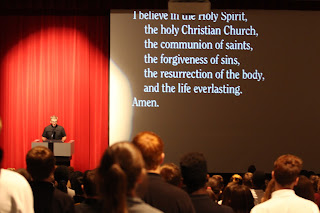Year 5 Day 57: Preaching to Teenagers
It is common in introductory conversations to ask one another what we do for a living. When I respond, "I teach high school," I usually get one of several responses:
It's true that working with youth, any youth, on a full-time basis is a labor of love - at least, for those of us who enjoy it and do it relatively successfully. My hubster put on his vicarage application that he wishes to become more comfortable working with youth; currently, it is his least favorite group with whom to share spiritual wisdom - especially the 12-16-year crowd. There are some techniques that can help improve their listening, though. Because they do listen. And watch. And learn.
Here are some observations on preaching to teenagers (especially for Hubster, who asked for my feedback before delivering his Veterans Day message at Monday's chapel).
There are some "best practices," which I admired during the message at our weekly chapel service last week. There are about 800 people who attend our Monday chapel service, a 35-minute worship time held in our auditorium. Most of the time, we start with a responsive reading, sing two or three hymns, and in addition to one or two scripture readings, a local pastor gives the message. It is not a Divine Service, though occasionally we do have confession and absolution.
Our hymns usually come from the Lutheran Service Book with organ accompaniment, though we have a student praise band that leads more contemporary songs a few times a year. Often the readings follow the lectionary from the previous day's Sunday service, and the pastors just retool their sermons from Sunday.
Well, some retool, others just repeat. Once in awhile, we'll get a pastor who regularly gives a 25-minute message, and then reads the entire thing for our student body, going well into second period class (you should hear the heavy sigh when the dismissal bell quietly rings in the hall and kids can't move). I wish I could say all 772 of our students hang on the Word of God, but when it gets much past ten or twelve minutes of sermon we start to lose kids. They doze or find other ways to amuse themselves (there are lot of things carved into our auditorium chairs).
Teenagers can often be immature and disrespectful, especially when among their peers as an audience. Our students sit with their second period classes, which works well if they're in the band (which is generally better behaved and participates in the service), and less so if it's a grade-level freshman English or algebra class.
It's also true that our teens realize right away if a minister tailored the message for them. Those who attend larger area churches might be hearing the same sermon from their own pastor 24 hours later. When they can tell that a minister prepared a message for that day's chapel for them, they listen better.
Our pastor last week did an excellent job in his message, and utilized three tactics at the beginning:
1. He did not preach from the podium on the stage but instead walked around the aisles of the auditorium for the entire message. This doesn't mean those who preach from the front are unsuccessful, but those who provide extra movement help engage kids of all ages.
2. He also elicited some interaction: he had us repeat three words ("Pharisee, Freedom, Live") that would be the outline for his message. This may be a common thing he does at his own church, but it's a great technique for teens. I often have my kids say "Yes" or nod their heads in response to something I said, just to get some interaction ("Everyone's tracking the notebook quiz tomorrow. Say, 'Notebook quiz tomorrow.' Thank you."). Mimicking the speaker helps both attention and retention.
3. He threatened to wake up anyone who was drifting off as he walked around. Teens who know we are paying attention (as opposed to sitting in the back of our room grading papers) instantly become more aware and alert.
His message was over John 8, where the Pharisees counter Jesus on how He can set them free when they aren't slaves to anyone. We often share that view; in America, we are free! How can we be slaves? I initially thought he was going to go the route of slaves to technology (I'd estimate at least 10% of our students are clinically addicted to their phones or ipads), or slaves to social media, or popularity. Instead, he stayed on the New Testament "slave to sin" idea, but focused on how we don't get excited about being made free. Our students have talent in music, athletics, and academics - our marching band took 8th at state last week, the Boys Cross Country team took 5th, and our football team is in the fourth round of sectionals. But none of those talents matter at all to their salvation.
My favorite part was when he told the kids to tell "the devil to go to hell." I worried he may make them shout it, which some of my more impressionable freshmen girls might find disconcerting, but he didn't. Basically, being a slave to sin enables us to develop the horrifying response of being bored by God's Word. This often happens in parochial schools, where kids get bombarded by devotions, prayer requests, theology classes, and chapel services, to the point where they stop listening. They are tempted to take for granted how exciting it is to learn about the love of Jesus and His sacrifice for their salvation.
This semester I do not have a chapel class, and I admit sometimes I have skipped - I use the time as an extra prep period. I was very glad I went last week - not only did I hear the Gospel, but I was reminded of great teaching techniques too!
"Wow! That takes a special person."
"What made you decide to do that?"Or:
"I'm so sorry." (said with a smile but the implication is still there)Generally if the conversation is with someone who teaches younger ages, we swap lines like, "How do you deal with all the snot and vomit?" followed by, "How do you handle all the hormones?" I find that those who teach at the secondary level shudder at the thought of kindergartners, and vice versa.
 |
| One of our pastors at weekly chapel (From our yearbook) |
Here are some observations on preaching to teenagers (especially for Hubster, who asked for my feedback before delivering his Veterans Day message at Monday's chapel).
There are some "best practices," which I admired during the message at our weekly chapel service last week. There are about 800 people who attend our Monday chapel service, a 35-minute worship time held in our auditorium. Most of the time, we start with a responsive reading, sing two or three hymns, and in addition to one or two scripture readings, a local pastor gives the message. It is not a Divine Service, though occasionally we do have confession and absolution.
Our hymns usually come from the Lutheran Service Book with organ accompaniment, though we have a student praise band that leads more contemporary songs a few times a year. Often the readings follow the lectionary from the previous day's Sunday service, and the pastors just retool their sermons from Sunday.
Well, some retool, others just repeat. Once in awhile, we'll get a pastor who regularly gives a 25-minute message, and then reads the entire thing for our student body, going well into second period class (you should hear the heavy sigh when the dismissal bell quietly rings in the hall and kids can't move). I wish I could say all 772 of our students hang on the Word of God, but when it gets much past ten or twelve minutes of sermon we start to lose kids. They doze or find other ways to amuse themselves (there are lot of things carved into our auditorium chairs).
Teenagers can often be immature and disrespectful, especially when among their peers as an audience. Our students sit with their second period classes, which works well if they're in the band (which is generally better behaved and participates in the service), and less so if it's a grade-level freshman English or algebra class.
It's also true that our teens realize right away if a minister tailored the message for them. Those who attend larger area churches might be hearing the same sermon from their own pastor 24 hours later. When they can tell that a minister prepared a message for that day's chapel for them, they listen better.
Our pastor last week did an excellent job in his message, and utilized three tactics at the beginning:
1. He did not preach from the podium on the stage but instead walked around the aisles of the auditorium for the entire message. This doesn't mean those who preach from the front are unsuccessful, but those who provide extra movement help engage kids of all ages.
2. He also elicited some interaction: he had us repeat three words ("Pharisee, Freedom, Live") that would be the outline for his message. This may be a common thing he does at his own church, but it's a great technique for teens. I often have my kids say "Yes" or nod their heads in response to something I said, just to get some interaction ("Everyone's tracking the notebook quiz tomorrow. Say, 'Notebook quiz tomorrow.' Thank you."). Mimicking the speaker helps both attention and retention.
3. He threatened to wake up anyone who was drifting off as he walked around. Teens who know we are paying attention (as opposed to sitting in the back of our room grading papers) instantly become more aware and alert.
His message was over John 8, where the Pharisees counter Jesus on how He can set them free when they aren't slaves to anyone. We often share that view; in America, we are free! How can we be slaves? I initially thought he was going to go the route of slaves to technology (I'd estimate at least 10% of our students are clinically addicted to their phones or ipads), or slaves to social media, or popularity. Instead, he stayed on the New Testament "slave to sin" idea, but focused on how we don't get excited about being made free. Our students have talent in music, athletics, and academics - our marching band took 8th at state last week, the Boys Cross Country team took 5th, and our football team is in the fourth round of sectionals. But none of those talents matter at all to their salvation.
My favorite part was when he told the kids to tell "the devil to go to hell." I worried he may make them shout it, which some of my more impressionable freshmen girls might find disconcerting, but he didn't. Basically, being a slave to sin enables us to develop the horrifying response of being bored by God's Word. This often happens in parochial schools, where kids get bombarded by devotions, prayer requests, theology classes, and chapel services, to the point where they stop listening. They are tempted to take for granted how exciting it is to learn about the love of Jesus and His sacrifice for their salvation.
This semester I do not have a chapel class, and I admit sometimes I have skipped - I use the time as an extra prep period. I was very glad I went last week - not only did I hear the Gospel, but I was reminded of great teaching techniques too!




Comments
Post a Comment